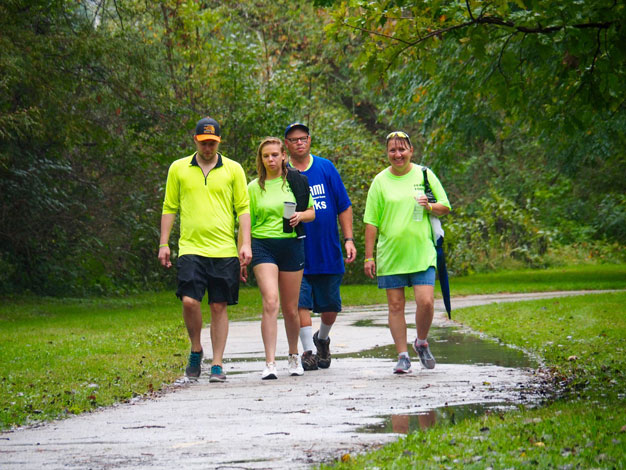
Walkers participate in the rainy 2019 NAMIWalks in Veterans Memorial Park in Bettendorf. NAMIWalks, an annual fundraising event, helps make mental health education and support groups available throughout Iowa and the nation. Visit (namigmv.org) to register for the Sept. 18 walk.
By Barb Arland-Fye
The Catholic Messenger
Laurie Edge did not see the warning signs that led a family member to take an overdose of prescription pills. As Laurie walked in the hallway of a hospital’s psychiatric ward nine years ago to visit her family member, wondering what lay ahead, she encountered a friend from church. The friend encouraged Laurie to take the Family-to-Family Education class that NAMI Greater Mississippi Valley offered for families supporting an adult living with a mental health condition.
“I immediately called the NAMI office,” recalled Laurie, who now serves as Support and Education Programs coordinator for NAMI-GMV. She and her husband, Sam, took the Family-to-Family class in 2012. “We came burdened with guilt, thinking we had done something wrong,” Laurie said.
“We walked into class that first night and found a great group of people,” families who needed to know they were not alone in a dark time. “Each week (of the 12-week class) we just soaked up everything like a sponge. Between the tears, we learned ‘You are not alone. There is help. There is hope,’” Laurie said. They were able to convey that message to their loved one. A mental health condition is an illness, not a failing.
Laurie shares her family’s experience to raise awareness that mental health conditions are treatable, recovery is possible and support is available through NAMI. The grassroots organization offers support for families of adults and of children living with a mental health condition, as well as peer-to-peer support for adults living with a mental health condition.
NAMIWalks, an annual fundraising event, helps make education and support groups available throughout Iowa and the nation. Visit the NAMI-GMV website (namigmv.org) for more information and to register for the NAMIWalks 5-K on Sept. 18 at Veterans Memorial Park in Bettendorf. NAMI-Iowa will hold its NAMIWalks 5-K on Sept. 25 in Johnston, Iowa (namiiowa.org). Participants also may participate in the walks virtually.
Support is a godsend
More than 40 million people in the U.S. live with mental illness. The ongoing pandemic — which spawned isolation, social and physical distancing and fear of the unknown — has contributed to an uptick in people dealing with mental health conditions.
NAMI-Iowa reports that an estimated one in five adults, or about 600,000 Iowans, live with some form of mental illness and about 37,000 deal with serious mental illness daily. One in three adults “reported experiencing depression or anxiety since the pandemic began” (www.nami.org).
Angela Gallagher, executive director of NAMI-GMV, said the organization strives to complement the work of health care professionals, social workers and school counselors and to promote understanding and support for individuals living with mental illness and their families. NAMI-GMV serves Scott, Clinton, Muscatine, Cedar and Jackson counties in Iowa and Rock Island, Henry and Mercer counties in Illinois.
Kent Ferris, director of the Social Action Office for the Diocese of Davenport, has served families who have a member living with mental illness. “I have also undertaken legislative advocacy to enhance mental health services. My master’s degree is in counseling. With all that knowledge, I still benefited greatly by taking NAMI’s Family-to-Family support class because it becomes real when a family member lives with mental illness.”
Laurie Edge said she and her husband especially benefited from the communications class of Family-to-Family, which taught participants how to talk to their loved ones and to read their body language. The instructors’ insights and lived experiences “changed our lives and our world,” Laurie said. She chose to “pay it forward” as a volunteer and now as an employee of NAMI-GMV. “I tell people I’m a NAMI-lifer. That’s how powerful it was for our family.”
Opening the door
“So many of us come to it (NAMI) because we have been walking that journey with our family member,” said Tami Bogosian of Davenport. She serves as a family support group facilitator for NAMI-GMV. “We’re there to offer support for those like ourselves, who have a family member over the age of 18 who is dealing with a mental health diagnosis or has in the past.” Support groups meet monthly, in-person (when possible) and virtually.
Tami’s family member lives with a mental health condition that developed after an accident years ago, but Tami did not discover NAMI until five years ago. The Family-to-Family Education class inspired her to volunteer with NAMI. “I am honored to be able to walk alongside people on this journey, even if it’s for a short time. No matter how far out we are on the journey, there’s always something to be learned.”
The “front door” to NAMI’s services is a 90-minute seminar called “NAMI Family & Friends” offered monthly to provide families with an opportunity to engage in mental health discussions with others. Certified NAMI family educators deliver the program, providing practical skills and information to address families’ immediate concerns, Angela said. (Register at www.namigmv.org/register.)
Programming has taken place virtually during COVID-19, but that format proved difficult for some families. They feared that their stories would not remain private in the virtual format. “We retooled the virtual and intercultural training,” Angela said. “It’s really about understanding how to reach out to people from different walks of life and reaching different types of groups.” Hispanic and Black communities tend to be more reluctant to seek support for dealing with the mental health condition of a loved one. NAMI is engaging in outreach with members of those communities to provide accompaniment on the journey.
Eliminating the stigma of mental illness, (NAMI prefers the term mental health condition) is another priority for NAMI supporters. With appropriate treatment and therapy, individuals with a mental health condition “go on to live successful and fulfilling lives, people from all walks of life,” Tami said. Some, however, may continue to struggle throughout life. The bottom line? “Everybody deserves to be treated with dignity and respect,” Tami said.











